|
|
Download |
|---|---|
|
Dec 25 2025
4th quarter 2025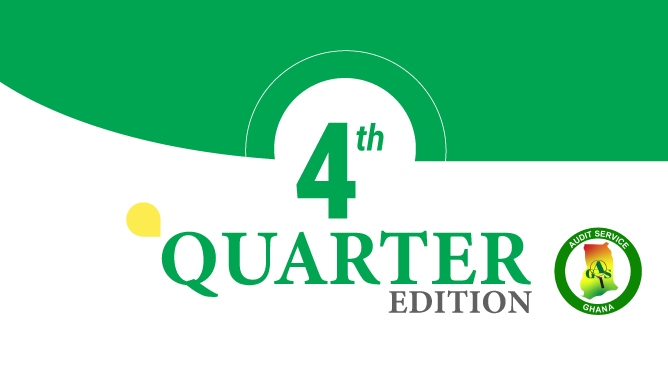
Season's Greetings from the Auditor-General As the year draws to a close, I wish to extend my heartfelt gratitude to our dedicated staff for your hard work and commitment to excellence in protecting the public purse. To our stakeholders, thank you for your trust and collaboration. May this Yuletide bring joy, peace, and time to cherish with loved ones. Wishing you a Merry Christmas and a prosperous New Year. May God be with you all. Download |
|
|
Oct 5 2025
3rd quarter 2025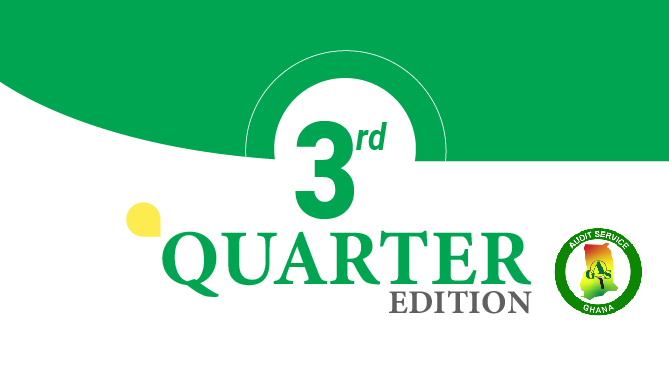
What is NACAP It was launched in 2014 by the government led by President Mahama and solely implemented by CHRAJ. Under NACAP 1, the framework for implementation covered a 10-year period for which all public sector institutions were tasked to set up NACAP Committees to promote the objectives of NACAP and fight corruption internally. NACAP 1 ended successfully after its 10 year implementation in December 2024 for which lessons learnt were captured in an evaluation report to guide the development of NACAP 11 again under President Mahama. Purpose and objective of NACAP The focus and objective of NACAP is to fight corruption and eliminate it from our system completely. NACAP 1 therefore created roles under the implementation framework for all public sector institutions based on their legal mandate to guide them in the implementation of NACAP objectives and the fight against corruption. The roles were either general or specific roles. Under NACAP 1, an entity is either a KIP (Key Implementing Partner) or ACA (Anti-corruption Agent) KAP. The KIPs are made up of entities that have prosecutorial powers and have the authority to hold persons accused of corruption accountable such as EOCO, FIC, POLICE CID, OSP, NBI etc. Then the ACA and KAP are entities that have the mandate to also perform administrative functions to hold persons accountable in the fight against corruption. Institutions like CHRAJ, Auditor-General, Judiciary, Parliament and Civil Society Organisations such as Centre for Democratic Development (CDD), Ghana Integrity Initiative (GII), Investigative Journalist (Free Spirits) fall in this category.
GAS therefore set up a NACAP Committee with the main responsibilities of sensitising staff on internal matters that bother on corruption and educate them on Dos and DONTs under NACAP to promote the fight against corruption. Download |
|
|
Jul 8 2025
2nd Quarter 2025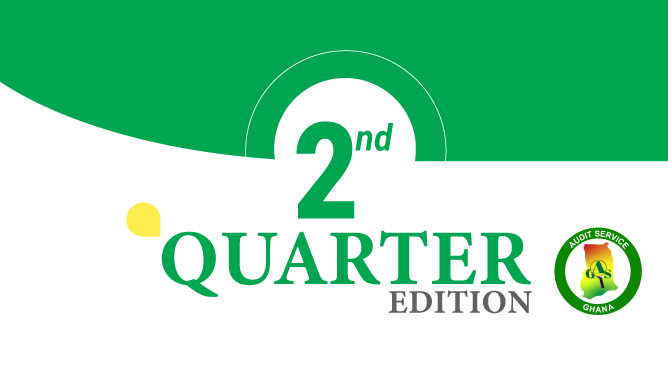
Audit Procedures: The role of substantive Tests and Test of Controls in Financial Audit
If so, what is an audit procedure? It is a specific activity or set of activities that an auditor undertakes to gather and evaluate evidence, ultimately forming an opinion on the fairness of the financial statements or the effectiveness of internal controls. It is basically procedures designed and followed by an auditor to test assertions made by management and confirm the accuracy and reliability of financial information contained in the financial statements. Assertions are the representations made by management, explicit or otherwise, that are embodied in the financial statements. There are two types of audit procedures, and these are “Test of Controls and Substantive Tests”. |
|
|
Apr 1 2025
1st Quarter 2025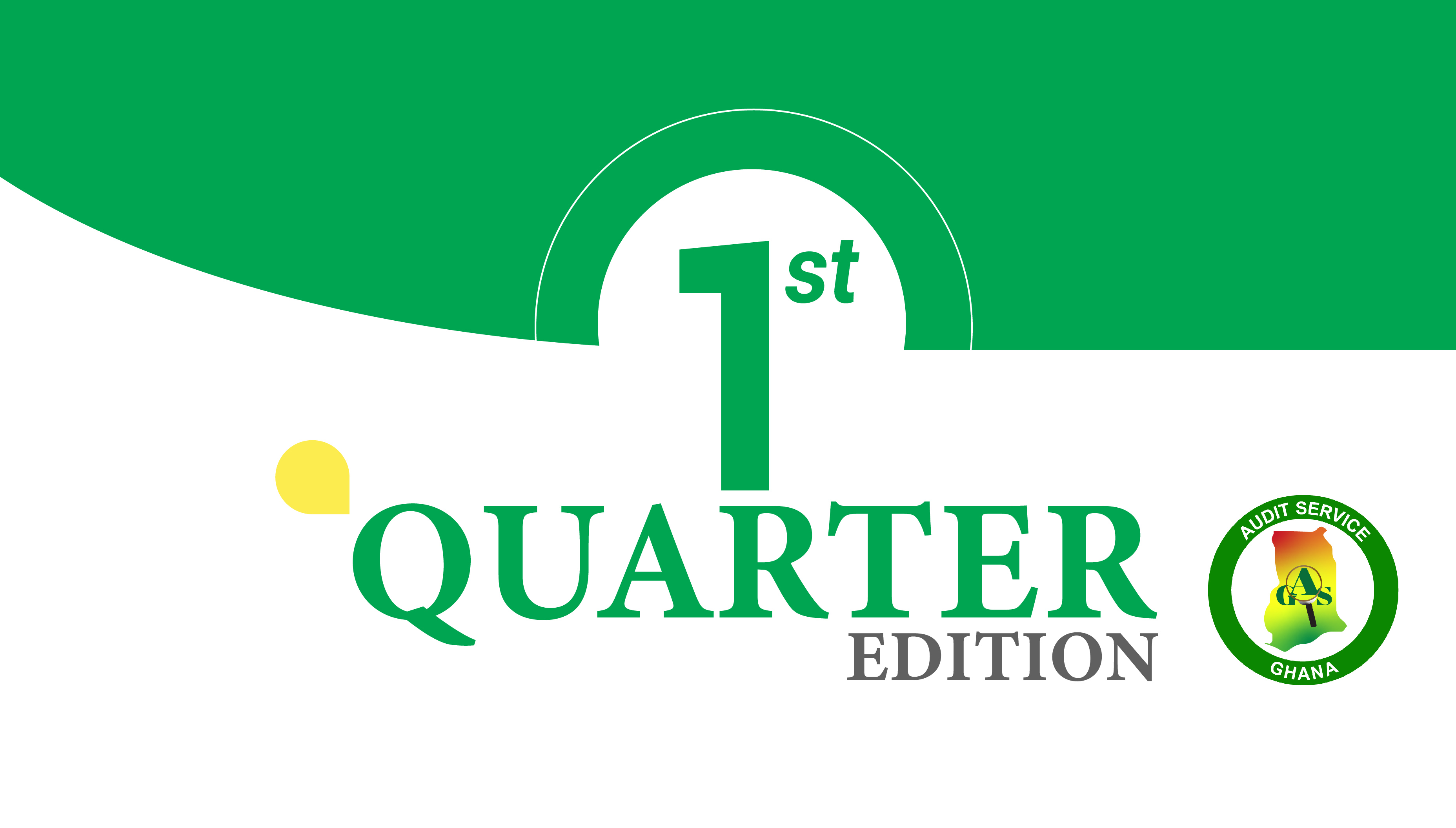
The future of public sector auditing and robotic process automation (RPA) application In an era where public enterprises are increasingly adopting technology and digitalization to stay competitive, public sector auditors are not only encouraged but also required to enhance their understanding of these developments to remain relevant. The traditional method of manually examining payment vouchers is becoming obsolete, making it essential for auditors to embrace new technologies. Public sector institutions are progressively integrating computer-based tools and software designed to reduce repetitive tasks and human intervention in conducting public business. Download |
|
|
Dec 31 2024
4th Quarter 2024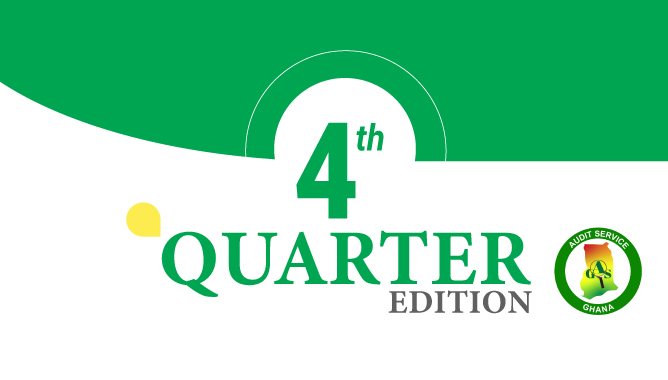
End of year message from Mr Johnson Akuamoah Asiedu, Auditor-General So soon another year has come to an end, and once again we are reminded of the celebration of the Birth of our Lord and Saviour Jesus Christ. I want to take this opportunity to express my heartfelt gratitude and appreciation to every one of you for your hardwork and commitment to the Service. Your tireless effort, dedication and resilience to sometimes exceed targets have not gone unnoticed. With all assurances, I say I am proud of the way we have, together as a team, achieved our goals. As we reflect on the reason for this season, let us remember the values of love, kindness and generosity that Jesus showed and taught us, and let us let these values guide us in our daily lives. I urge you all to, also, take time relax, recharge and enjoy the company of your loved ones as you deserve it for all the hard work! On behalf of Management, I wish you a joyous Christmas holiday and a Happy New Year. May God bless you and your families; and may 2025 bring us all peace, good health and success. Ayekoo and Afehyiapa . Download |
|
|
Oct 2 2024
3rd Quarter 2024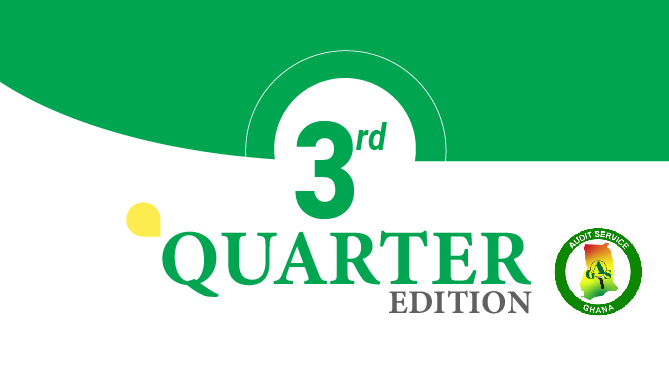
Citizens eye sensitization in five regional capitals The Citizenseye campaign supported by GIZ, has successfully raised awareness about the Citizenseye Mobile Application that enables citizens to participate in promoting accountability in public offices through the App. With the slogan “Speak Out! Your Silence Will Hurt Everyone”, the campaign seeks to cultivate a culture of transparency, accountability, and active citizen participation in governance. The campaign was held in five regional capitals: Accra, Bolgatanga, Sunyani, Tamale, and Wa. The Audit Service team engaged the public through a series of activities, including floats through principal streets, sensitization sessions in churches and Launched in 2019, the App enables users to report suspected cases of mismanagement, fraud, abuse, wastage, and other irregularities in five key areas: education, health, environment, infrastructure, and agriculture. Users can also rate public service delivery and provide feedback to the Auditor-General on government policy implementation. The App's objectives include following up on reported cases of corruption and abuses of the public purse, as well as identifying areas of public interest and prioritizing performance and financial audits. Feedback from stakeholders and download of the App after the campaign shows that awareness has increased and the campaign has successfully generated public interest in the App. Download |
|
|
Jun 30 2024
2nd quarter 2024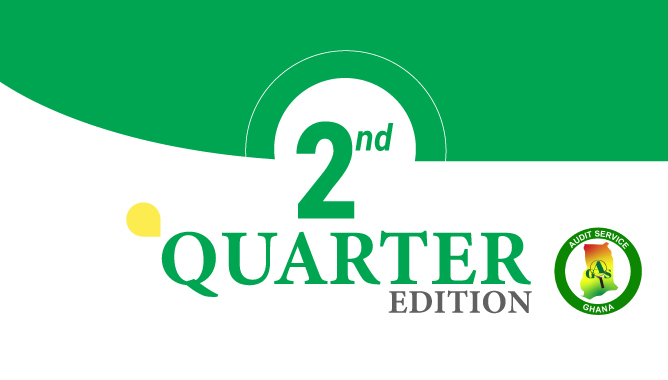
Being time conscious is crucial for Auditors for several reasons:
2. Productivity: Time management leads to increased productivity. When an Auditor allocate time appropriately to tasks, he/she can accomplishmore in a shorter period. 3. Professionalism: Being punctual shows respect for others' time, which is essential in both personal and professional settings. It builds trust and reliability. 4. Opportunity: Time-conscious Auditors seize opportunities quickly. They can respond promptly to changes and take advantage of favorable situations. 5. Reduced Stress: Effective time management reduces stress levels of Auditors. When you plan well and complete tasks on time, you're less likely to feel overwhelmed or rushed. 6. Goal Achievement: Time consciousness helps in achieving your audit objectives. By consistently allocating time to important tasks, you make progress towards your objectives. Download |
|
|
Apr 8 2024
1st quarter 2024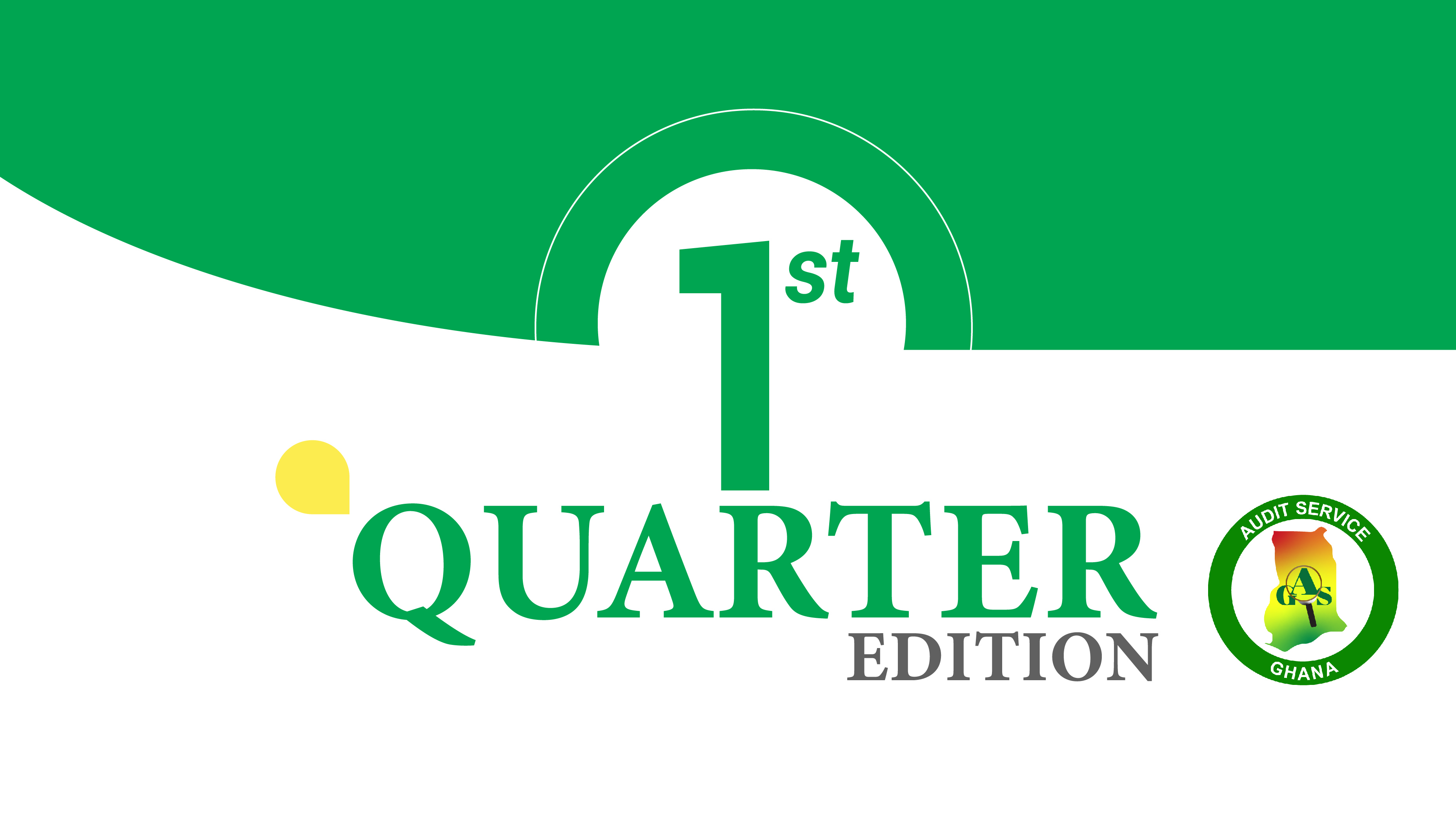
Internal Controls Internal control is defined as all the policies and procedures conceived and put in place by an entity’s/organization’s management to ensure:
Examples of Internal Control Segregation of Duties Physical Controls Reconciliations Policies and Procedures Transaction and Activity Reviews Information Processing Controls |
|
|
Dec 28 2023
4th quarter 2023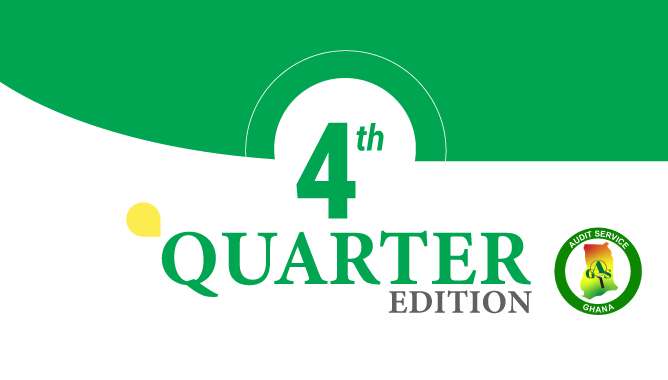
End of year message from Mr Johnson Akuamoah Asiedu - Auditor-General As we stand at the threshold of the holiday season, I am filled with pride and gratitude for the remarkable journey we have undertaken together this year. Your unwavering dedication and commitment has not only defined our collective success but has also made a lasting impact on the landscape of audit excellence. We achieved major feats in the year 2023 which includes our recent recognition at the 19th Governing Board Meeting of AFROSAI-E, where our Performance and Special Audits Department received the prestigious award for the best performance audit report, a second time in succession. This accolade reflects the exceptional professionalism each of you embodies and the progress we have made in advancing transparency, accountability, and audit excellence. The Service has therefore been nominated by INTOSAI to serve on the performance audit standards committee. With our combined efforts we were able to recover a significant amount of GHS19,631,516.63 from disallowance and through payroll audits, saved the government GHS21,875,570.53. This monumental achievement highlights your meticulous work and commitment to upholding financial integrity. This recovery is more than just a number; it symbolizes our influence in promoting fiscal responsibility and accountability in service to Ghana. Download |
|
|
Oct 9 2023
3rd quarter 2023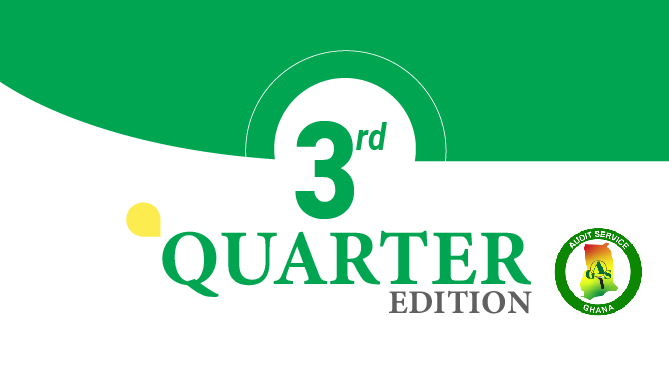
Audit and its types
What is an Audit? We should be mindful that no matter how extensive the definition of audit is, it will be difficult, if not impossible, to cover all types of audits as we will see in the subsequent paragraphs. Types of Audit Financial Statements Audit |
|
|
Jul 14 2023
2nd quarter 2023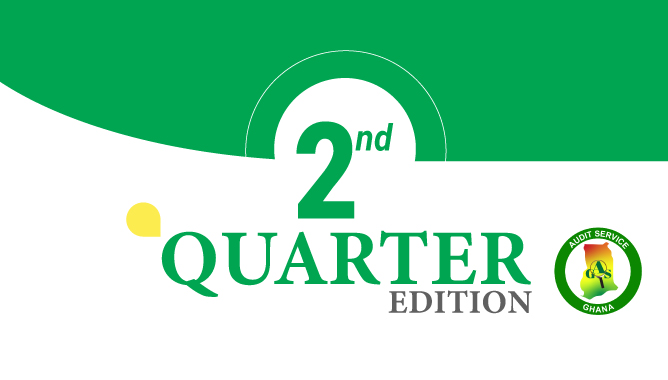
GAS - Audit Management Information System The advent of information and communication tech-nology (ICT) has changed many aspects of business processes including the conduct of audit engagement. Therefore, the continuous use of manual processes in carrying out audit assignments has be-come a thing of the past. In this regard, automation of the audit process will afford the achievement of efficiency, effective-ness and act as a repository for Audit Service. Since then, most SAIs have either auto-mated or are in the process of automating the underlisted adopted audit methodolo-gies with accompanying working papers.
|
|
|
Apr 10 2023
1st quarter 2023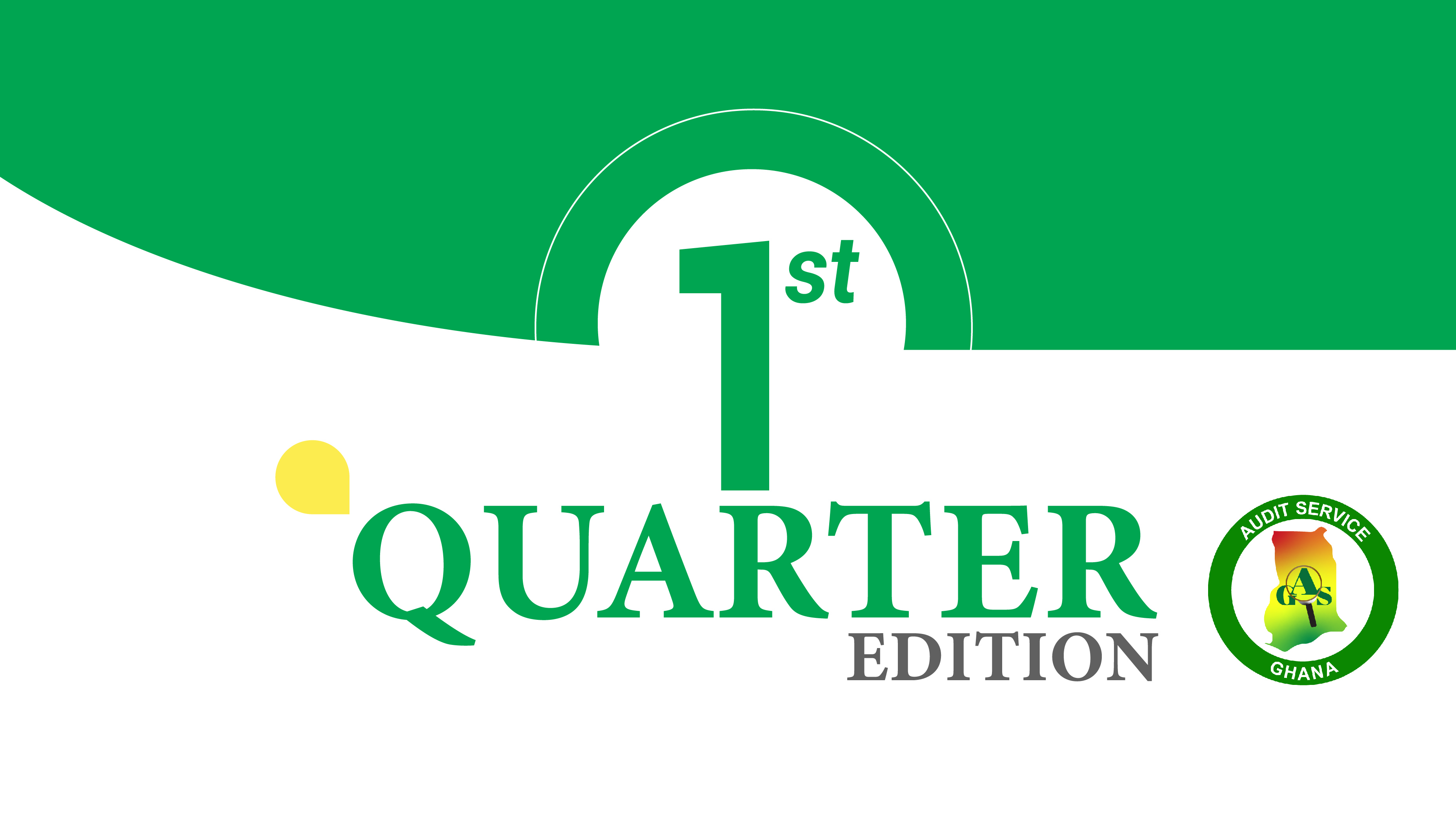
Auditor-General calls on staff to be diligent ‘‘Gone are the days when we write our report nobody cares, nobody is interested in it but now I know, and you know that when the Audit Service writes one sentence it makes national news and for a week or more it becomes topic for discussion’’. This, he said, required the auditor to be accurate and have sufficient evidence to support the work because the public is ready to challenge the audit. Download |
|
|
Dec 25 2022
4th quarter 2022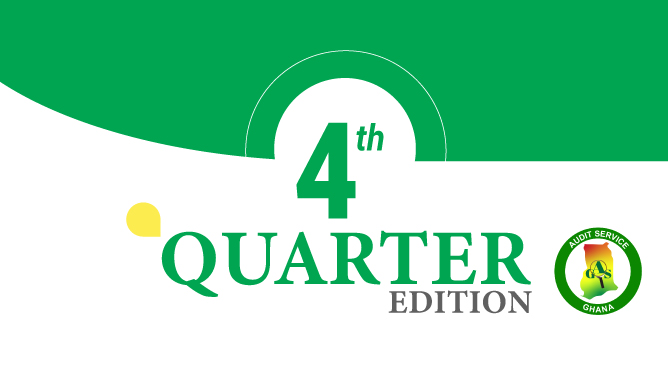
Christmas Message from Mr Johnson Akuamoah Asiedu - Auditor-General Each year comes and slides away with its own hopes, fears, laughter, and challenges, but we are assured that everyone has the resilience to contain whatever it offers as long as we have been blessed with life. Another year has come to an end, granting us the opportunity to reflect on our achievements and disappointments. Collectively, we chalked great success towards the achievement of our mandate and in the fight against corruption. My greatest appreciation goes to all staff who exhibited strength, diligence, and perseverance in delivering on assignments and seeing through audit programs. I would like to use this season to say a big thank you to every staff of the Service for your hard work, commitment, and dedication to building a better Audit Service for our motherland Ghana. You have all proved to be loyal to the Service and even when in our minds, sometimes, we may have doubted ourselves, we still accomplished our goals, and I can say nothing better than ayekoooooooooooo! Together let us forge toward our vision, never relenting, doing as much as we can, whenever we can. May love, laughter, success, and good health be our lot in 2023. And for the Service, may we strive to attain greater heights in all our endeavors. God richly bless you all!!! Merry Christmas and a Happy New Year!!! Download |
|
|
Oct 26 2022
3rd quarter 2022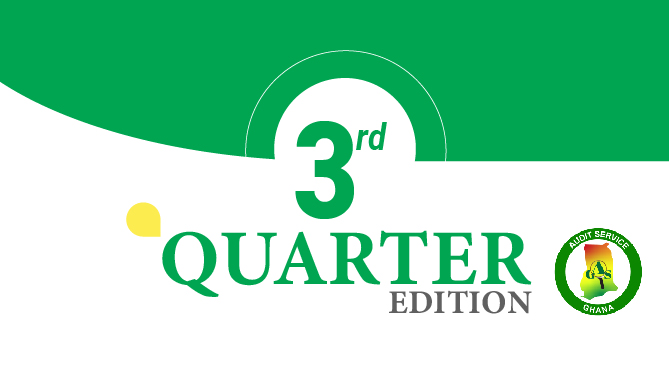
Review of audit reports (notes to A-G’s reports, management letters etc.) for quality outcomes Who is responsible for the review? |
|
|
Jul 2 2022
2nd quarter 2022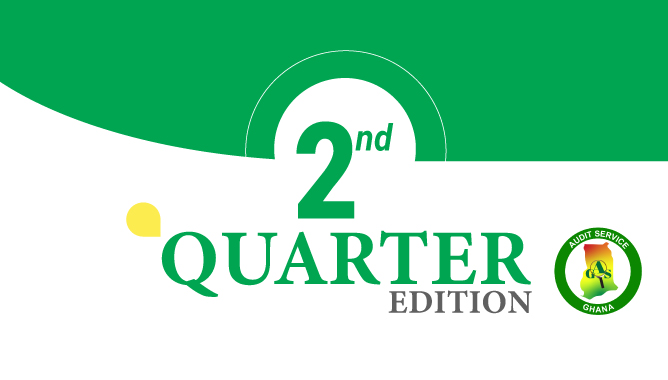
Validation of financial statements and expressing independent audit opinion on them is an annual “ritual” in Public Sector Audit, for that matter, Ghana Audit Service, backed by regulatory frameworks. Download |
|
|
Apr 2 2022
1st quarter 2022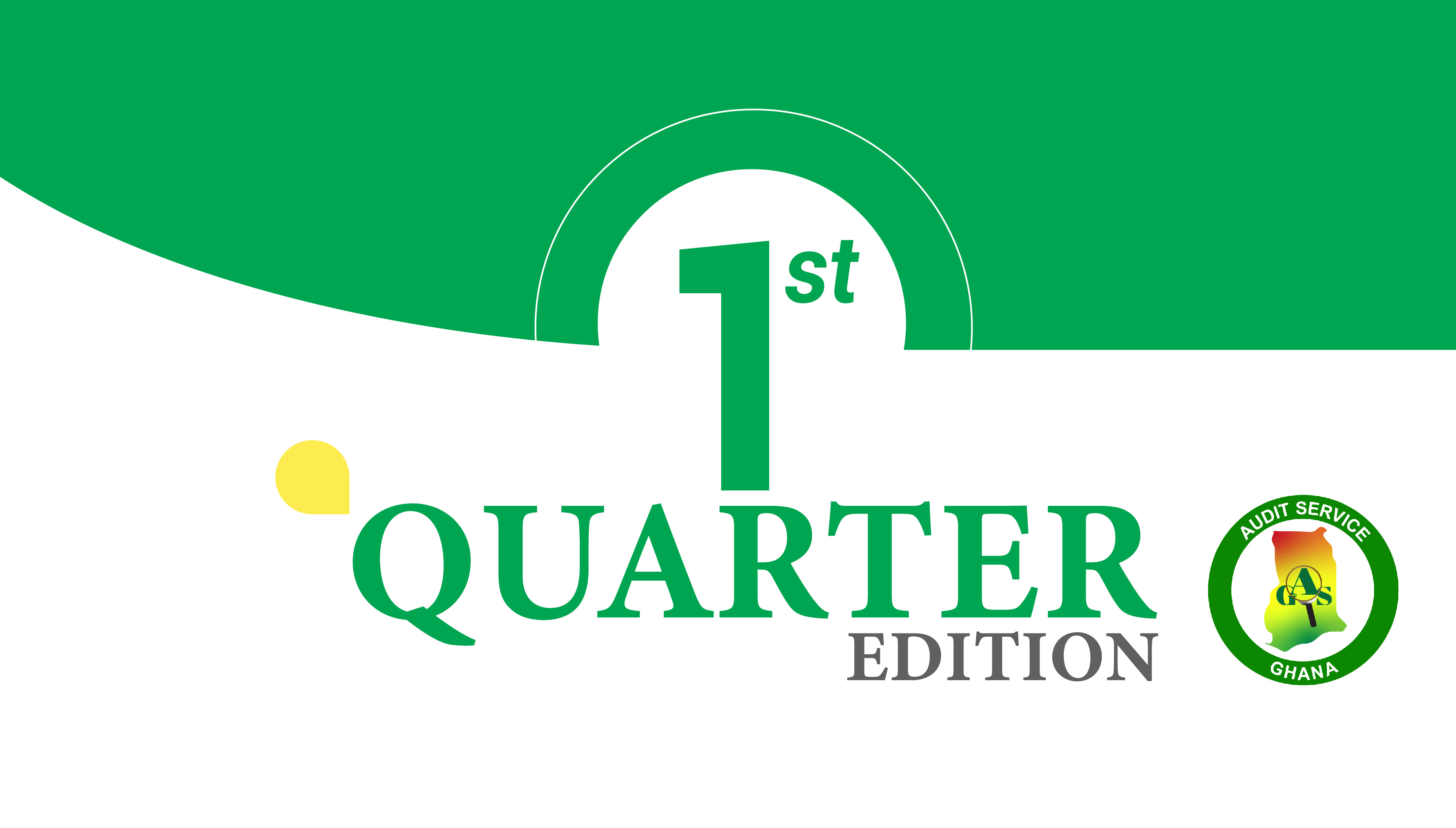
Mr. Johnson Akuamoah Asiedu, the Auditor-General (A-G), has called on heads of public institutions to show keen interest and heighten their supervisory role over finances, areas of revenue, and expenditure in their institutions. This would help in reducing the number of irregularities and financial infractions recorded in public institutions in the country. Download |
|
|
Dec 31 2021
4th quarter 2021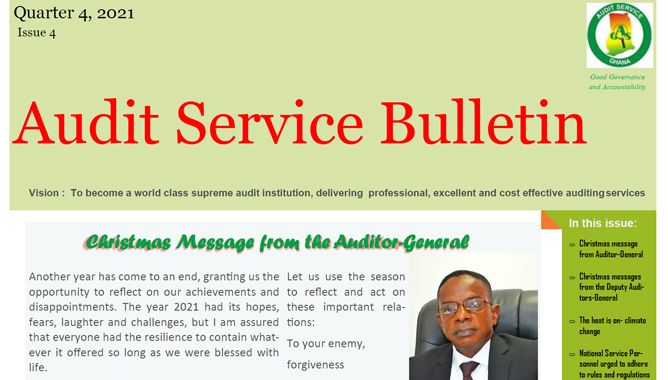
Another year has come to an end, granting us the opportunity to reflect on our achievements and disappointments. The year 2021 had its hopes, fears, laughter, and challenges, but I am assured that everyone had the resilience to contain whatever it offered so long as we were blessed with life. The year was challenging as the country and the whole world continued to battle with the Covid-19 pandemic, but by the grace of the Almighty God, we sailed through. Download |
|
|
Sep 30 2021
3rd quarter 2021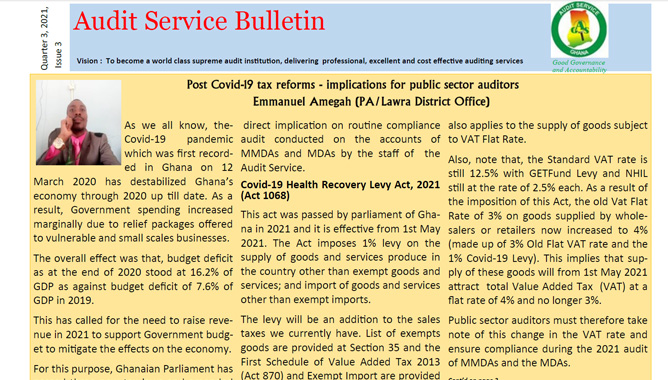
As we all know, the-Covid-19 pandemic which was first recorded in Ghana on 12 March 2020 has destabilized Ghana’s economy through 2020 up till date. As a result, Government spending increased marginally due to relief packages offered to vulnerable and small scales businesses. The overall effect was that the budget deficit by the end of 2020 stood at 16.2% of GDP as against the budget deficit of 7.6% of GDP in 2019. Download |
|
|
Jun 30 2021
2nd quarter 2021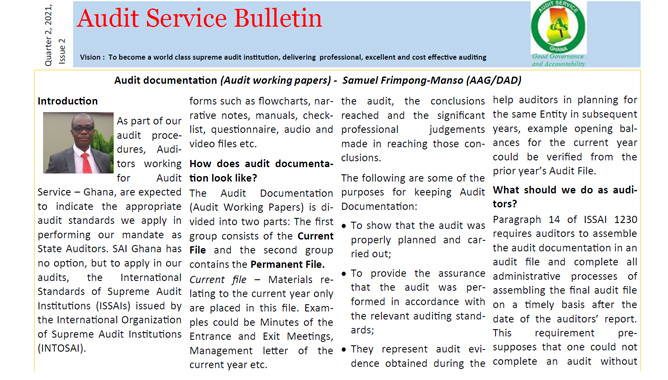
As part of our audit procedures, Auditors working for Audit Service – Ghana, are expected to indicate the appropriate audit standards we apply in performing our mandate as State Auditors. SAI Ghana has no option, but to apply our audits, the International Standards of Supreme Audit Institutions (ISSAIs) issued by the International Organization of Supreme Audit Institutions (INTOSAI). Download |
|
|
Mar 31 2021
1st quarter 2021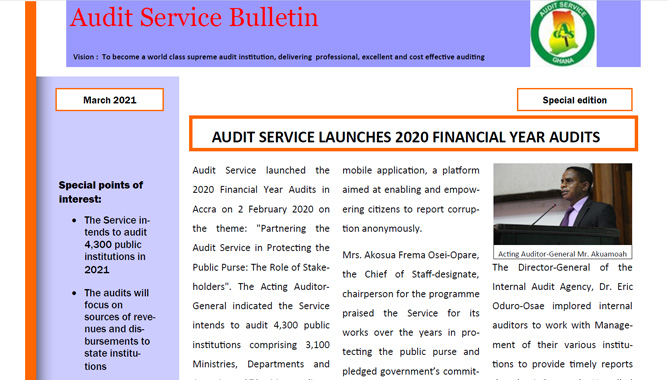
Audit Service launched the 2020 Financial Year Audits in Accra on 2 February 2020 on the theme: "Partnering the Audit Service in Protecting the Public Purse: The Role of Stake-holders". The Acting Auditor-General indicated the Service intends to audit 4,300 public institutions comprising 3,100 Ministries, Departments, and Agencies, 270 Metropolitan, Municipal, and District Assemblies, 800 pre-tertiary institutions, 40 subvented organizations, and state-owned enter-prises, 52 Ghana Missions and Consulates as well as four performances in 2021. Download |
|
|
Dec 31 2020
4th quarter 2020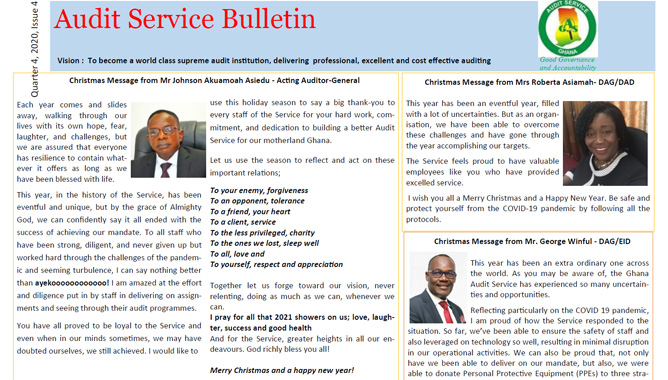
Each year comes and slides away, walking through our lives with its own hope, fear, laughter, and challenges, but we are assured that everyone has the resilience to contain whatever it offers as long as we have been blessed with life. This year, in the history of the Service, has been eventful and unique, but by the grace of Almighty God, we can confidently say it all ended with the success of achieving our mandate. To all staff who have been strong, diligent, and never given up but worked hard through the challenges of the pandemic and seeming turbulence, I can say nothing better than ayekoooooooooooo! I am amazed at the effort and diligence put in by staff in delivering on assignments and seeing through their audit programs. Download |
|
|
Sep 30 2020
3rd quarter 2020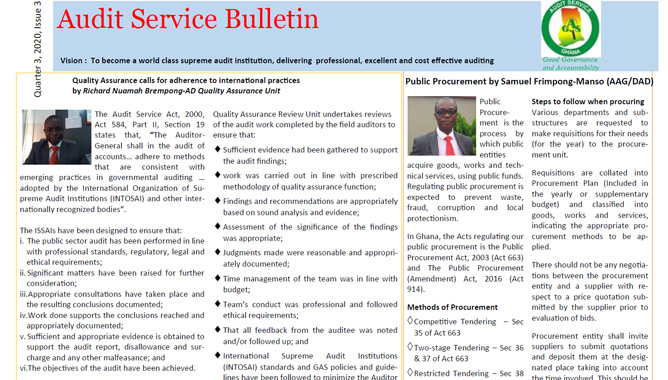
The Audit Service Act, 2000, Act 584, Part II, Section 19 states that, “The Auditor-General shall in the audit of accounts… adhere to methods that are consistent with emerging practices in governmental auditing … adopted by the International Organization of Supreme Audit Institutions (INTOSAI) and other internationally recognized bodies”. Download |
|
|
Jun 30 2020
2nd quarter 2020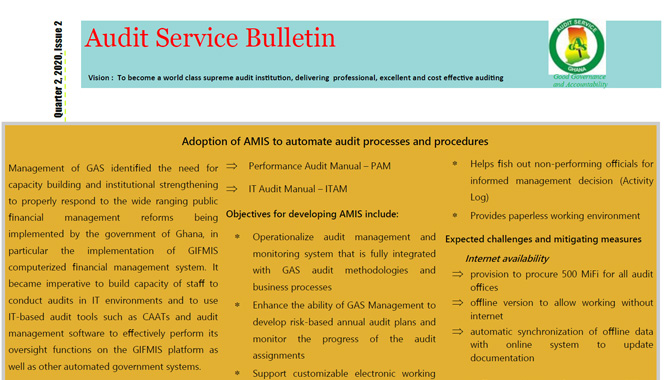
Management of GAS identified the need for capacity building and institutional strengthening to properly respond to the wide ranging public financial management reforms being implemented by the government of Ghana, in particular the implementation of GIFMIS computerized financial management system. It became imperative to build capacity of staff to conduct audits in IT environments and to use IT-based audit tools such as CAATs and audit management software to effectively perform its oversight functions on the GIFMIS platform as well as other automated government systems. Download |
|
|
Mar 31 2020
1st quarter 2020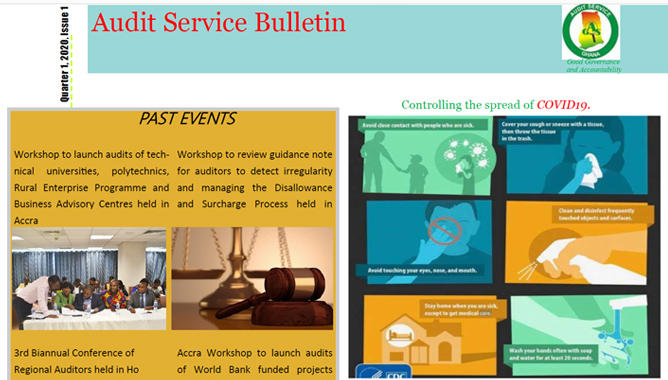
The Office of the Auditor-General (OAG) is the Supreme Audit Institution (SAI) of Ghana and one of the monitoring and ac-countability organs of the state. It is a Public Service institution set up as the machinery by which the Auditor-General executes his mandate. The 1992 Constitution (Articles 184, 187, and 286) has established a broad mandate for the Auditor-General to carry out. Download |